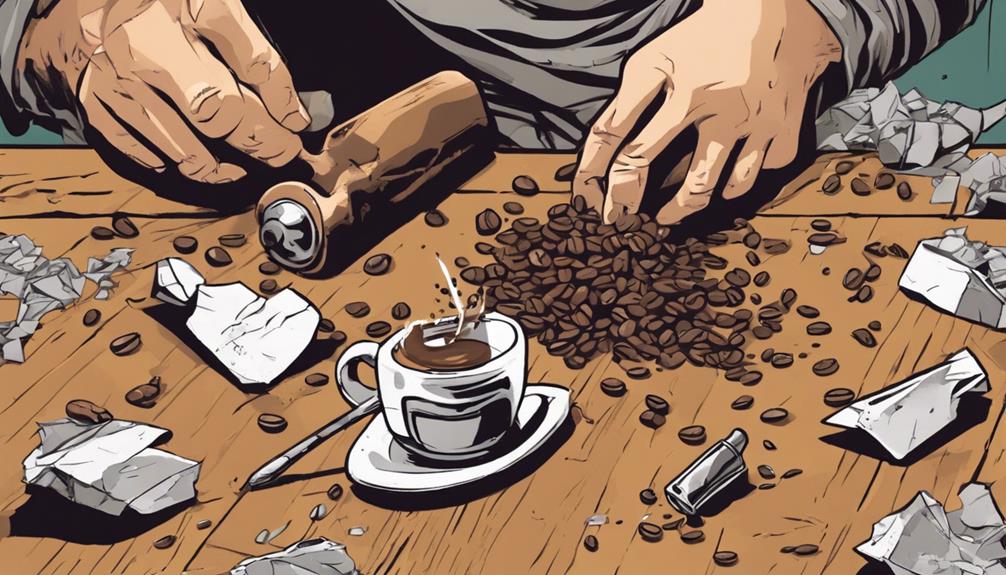For a smoother morning routine without frequent trips to the bathroom caused by coffee, consider choosing a darker roast and remember to stay hydrated. Dark roasts typically have lower acidity levels, reducing the chances of a laxative effect. Explore different roast options to discover new flavors. If necessary, try decaf or low-caffeine varieties and be cautious of additives like milk that may disrupt digestion. Herbal teas such as peppermint or ginger can offer a gentle alternative. Monitoring your fiber intake and incorporating probiotic-rich foods like yogurt into your diet can help support gut health. By making thoughtful dietary choices alongside your coffee consumption, you can start your day without any unexpected setbacks.
Key Takeaways
- Opt for low-acid or decaf coffee to reduce bowel stimulation.
- Limit milk in coffee to avoid digestive distress and bowel movements.
- Stay hydrated and incorporate fiber-rich foods to regulate digestion.
- Experiment with herbal teas or chicory root coffee as alternatives.
- Monitor caffeine intake and timing of coffee consumption for smoother mornings.
Understanding Coffee's Digestive Effects
Understanding how coffee affects your digestion is vital in managing its potential impact on your bowel movements. Coffee contains compounds like chlorogenic acid and caffeine, which can stimulate bowel movements by increasing gastric acid release. This heightened gastric acid can activate your colon, leading to more frequent trips to the bathroom.
However, the extent of these digestive effects varies from person to person based on individual tolerance levels. Opting for a darker roast with lower acidity may help reduce the laxative effect of coffee on your digestive system.
To minimize the impact of coffee on your bowel movements, it's essential to stay hydrated and maintain a balanced diet. Proper hydration can aid in digestion and prevent dehydration, which can exacerbate the laxative effects of coffee. Additionally, a diet rich in fiber and nutrients can support healthy digestion and potentially offset the disruptive effects of coffee on your bowel habits.
Choosing the Right Coffee Brew

When selecting your coffee brew, consider the roast level varieties, such as light, medium, and dark, each offering a unique flavor profile.
Opting for decaf or low-caffeine options can help minimize the potential stimulating effects on your digestive system.
Be mindful of additives like milk or cream, as they may impact how your body responds to your morning cup of coffee.
Roast Level Varieties
To find the perfect coffee brew for your taste preferences, consider exploring the different roast levels available, each offering distinct flavor profiles.
Light roast coffee presents a more acidic flavor, medium roast provides a balanced taste, and dark roast offers a bold flavor experience. Experimenting with these roast levels can help you discover your preferred coffee flavor and aroma.
If you're looking to minimize the stimulating effects on your digestive system, you might want to opt for decaf or low-caffeine coffee options. Understanding the characteristics of light, medium, and dark roasts can guide you in selecting the right coffee brew to enjoy without experiencing coffee poops.
Decaf and Low-Caffeine Options
Consider exploring decaf and low-caffeine options when selecting the right coffee brew to enjoy without experiencing coffee poops. Decaf coffee, known for its greatly reduced caffeine content, can help lessen the stimulant effect on bowel movements.
Opting for low-caffeine choices such as half-caff can also minimize the likelihood of encountering coffee-induced digestive issues. Lowering your caffeine intake by switching to decaf or low-caffeine coffee varieties is particularly beneficial for individuals sensitive to coffee's laxative effects.
Impact of Additives
You can enhance your coffee-drinking experience by being mindful of additives that may impact the flavor and your digestion. When choosing the right coffee brew, consider the impact of additives on your digestive system. Here are some tips to help you manage digestive issues and enjoy your coffee without the unwanted side effects:
| Impact of Additives | Recommendations |
|---|---|
| Low-Acid Coffee | Opt for low-acid coffee varieties to minimize digestive disturbances. |
| Experiment with Roasts | Try different coffee roasts like light, medium, or dark to find the best option for your taste preferences. |
| Avoid Milk or Cream | Skip adding milk or cream to your coffee if you experience digestive problems after consumption. |
Additionally, if you're sensitive to caffeine, consider decaf or low-caffeine options to reduce the stimulant effect on your digestive system. By being mindful of these factors, you can enjoy your coffee without the unpleasant consequences.
Exploring Alternatives to Coffee

If you're looking to switch up your morning beverage routine, exploring alternatives to coffee can offer you a variety of soothing and flavorful options.
Herbal teas such as peppermint, ginger, and chamomile provide a calming alternative without the digestive side effects of coffee.
For a caffeine-free option with a rich taste, consider chicory root coffee.
Matcha green tea not only offers sustained energy but also comes with various health benefits and is gentle on the stomach.
Yerba mate, originating from South America, can boost focus and energy levels as a coffee substitute.
Additionally, warm beverages like dandelion root tea and lemon balm can provide digestive benefits without the bowel-stimulating effects of coffee.
Managing Coffee's Impact on Bowel Movements

The impact of coffee on bowel movements can be managed by adjusting your consumption habits and considering factors like acidity and timing.
Caffeine in coffee stimulates colon contractions, potentially causing increased bowel movements known as 'coffee poops.' The acidity of coffee and compounds like chlorogenic acid can also trigger gastric acid release, activating the colon.
To mitigate these effects, you can consider managing your coffee consumption by opting for low-acid brews or decaf alternatives. Additionally, the timing of your coffee intake can influence its impact on bowel movements, so adjusting when you drink your coffee may help regulate its effects.
It's crucial to be mindful of the gastrointestinal effects of coffee and how different additives like dairy can further impact your digestive system. By making informed choices about the type of coffee you drink, when you drink it, and what you add to it, you can better manage its influence on your bowel movements.
Nutritional Tips for Coffee-Related Bowel Issues

Incorporating high-fiber foods like whole grains, fruits, and vegetables can help regulate bowel movements affected by coffee. Fiber adds bulk to your stool, aiding in smoother bowel movements and potentially reducing the urgency caused by coffee consumption.
Additionally, including probiotic-rich foods such as yogurt in your diet can support gut health and counteract digestive discomfort linked to coffee.
Monitoring your total caffeine intake, not just from coffee but also other sources, is essential for managing its impact on bowel movements. Being mindful of what you eat and drink, and avoiding artificial sweeteners in your coffee, can further alleviate any digestive issues you may experience.
Staying hydrated is vital for overall digestive health and can help mitigate the potential laxative effects of coffee. Ensuring you drink enough water throughout the day can support regular bowel movements and reduce any discomfort associated with coffee-induced pooping.
Factors Contributing to Coffee-Induced Pooping

Let's talk about why coffee makes you poop.
Caffeine and acids in coffee stimulate your colon and increase gut contractions, leading to more frequent bowel movements.
Additives like milk can also play a role in stimulating your bowels when you drink coffee.
Bowel Stimulating Compounds
Consider these key factors that contribute to the coffee-induced pooping phenomenon.
Caffeine in coffee stimulates the colon, promoting increased bowel movements by triggering gut contractions.
Additionally, the acids present in coffee stimulate intestinal muscles, leading to heightened gastric acid production, which can further stimulate bowel movements.
Additives like milk or creamer can also play a role in increasing bowel stimulation for some individuals.
Besides, the timing of coffee consumption may align with the body's natural patterns of bowel movements, intensifying the need to poop after drinking coffee.
Understanding how coffee affects the body's gastrointestinal system can help you anticipate and manage the potential bowel-stimulating effects of your morning cup.
Coffee's Colon Impact
To understand why coffee often leads to increased bowel movements, it is essential to recognize the impact of caffeine and acids on your colon's activity. Caffeine stimulates colon contractions, while the acids in coffee trigger intestinal muscle activity, leading to heightened gastric acid production. These factors combined contribute to the increase in bowel movements after consuming coffee. The effect of coffee on gut contractions can vary among individuals, influencing bowel movements differently based on individual bowel responses. Moreover, additives in coffee such as milk, creamer, and sugar can also play a role in stimulating bowel movements. Additionally, the timing of coffee consumption can align with your body's natural bowel movement patterns, potentially influencing the urge to poop.
| Factors Contributing to Coffee-Induced Pooping | Effects |
|---|---|
| Caffeine stimulation | Increased colon contractions |
| Acids in coffee | Trigger intestinal muscle activity and gastric acid production |
| Additives in coffee | Can contribute to stimulating bowel movements |
| Coffee consumption timing | Alignment with natural bowel movement patterns |
Milk and Bowel Stimulation
When adding milk to your coffee, be aware that it can contribute to bowel stimulation, especially for individuals with lactose intolerance. The mixture of coffee and milk can prompt increased gastric acid production and intestinal contractions, potentially leading to digestive distress.
Lactose, a sugar present in milk, can be troublesome for those with lactose intolerance, causing symptoms like diarrhea and bloating. If you find that milk in your coffee exacerbates your digestive issues, consider switching to lactose-free alternatives or dairy-free options to mitigate the effects on your bowel movements.
For individuals sensitive to dairy products, the combination of coffee and milk may worsen existing digestive troubles, making it essential to be mindful of how your body reacts to this common morning beverage. By making small adjustments like opting for lactose-free milk or non-dairy creamers, you can enjoy your coffee without experiencing unwanted bowel stimulation.
Frequently Asked Questions
How to Avoid Pooping After Drinking Coffee?
To avoid pooping after drinking coffee, try low-acid varieties, decaf, or half-caff options. Skip dairy additives and opt for herbal teas. Experiment with brewing methods and roasts. Find what's gentle on your stomach and bowels.
What Is the Simple Trick That Helps Empty Your Bowels Every Morning?
To empty your bowels every morning, try starting your day with a glass of warm water. It helps hydrate and activate your digestive system, promoting regularity naturally. This simple routine can support healthy bowel movements without relying on coffee-induced poops.
Why Do I Have Loose Stools After Coffee in the Morning?
When you have loose stools after morning coffee, it's likely due to caffeine stimulating colon contractions and coffee's acidity increasing bowel movements. Adjusting coffee timing or type can help manage this issue and avoid discomfort.
Is Morning Coffee a Laxative?
Morning coffee is not a laxative for everyone. While caffeine can stimulate bowel movements, individual tolerance levels vary. Enjoy your cup mindfully to align with your body's natural rhythm, and consider adjusting consumption timing for a smoother morning routine.
Conclusion
So, next time you're craving that morning pick-me-up, remember to choose your brew wisely and consider alternatives to avoid those dreaded coffee poops. Additionally, incorporating a ketofriendly bulletproof coffee recipe into your routine can provide sustained energy without the negative digestive effects of traditional coffee. By blending high-quality coffee with grass-fed butter and MCT oil, you can enjoy a creamy and satisfying beverage that won’t send you running to the bathroom. So, when you’re feeling the need for a caffeine boost, opt for a healthier alternative that won’t disrupt your digestive system.
By being mindful of your coffee intake and making small changes to your routine, you can enjoy a smooth morning without any digestive discomfort. You can start by switching to a gentler coffee roast or opting for decaffeinated coffee to reduce the acidity. Additionally, being mindful of portion sizes and not consuming coffee on an empty stomach can also help alleviate any digestive issues. It’s also important to be aware of alternative methods of consuming coffee, such as coffee enemas and SIBO, which may have different effects on your digestive system. Always consult with a healthcare professional before making any significant changes to your coffee consumption or trying new methods of consumption.
Just like a well-balanced symphony, finding harmony with your caffeine consumption can lead to a more harmonious start to your day.
Cheers to a happier, healthier gut!









